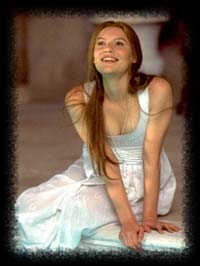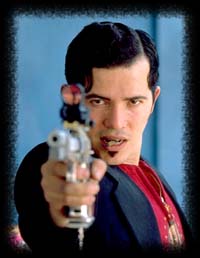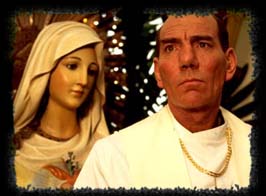![[safe]](safe.gif)

William Shakespeare's Romeo & Juliet

Starring Leonardo DiCaprio, Claire Danes, John Leguizamo,
Pete Poselthwaite, Harold Perrineau, Paul Sorvino,
Brian Dennehey, Diane Venora, Christina Pickles
Directed by Baz Luhrman
![[safe]](safe.gif)


Bright, brash and so full of eye-candy it bears repeated viewing (for visual purposes only), Baz Lurhman's modernist take on Shakespeare's beloved tale of thwarted teenage love and angst benefits from a director who's visually confident and a script that smartly updates situations and scenarios for the hip cool feel it strives for. On top of that, it also has three excellent performances which make up for many other shortcomings, elevating the film from pedestrian gimmick to mindless entertainment.
 By now, everyone surely must know the story of the feuding Capulet and Montague families, and how the war between royalty spilt over to premature death and suicide for the brightest sparks in the next generation. What the film's script makes clear for those who never paid much attention to the details of the original text is the fact that Romeo was a somewhat fickle-hearted youth who pined for other women, that some of the best lines in the play were all spoken by Juliet, and, if all else fails, kill someone to keep a flagging plot from dying.
By now, everyone surely must know the story of the feuding Capulet and Montague families, and how the war between royalty spilt over to premature death and suicide for the brightest sparks in the next generation. What the film's script makes clear for those who never paid much attention to the details of the original text is the fact that Romeo was a somewhat fickle-hearted youth who pined for other women, that some of the best lines in the play were all spoken by Juliet, and, if all else fails, kill someone to keep a flagging plot from dying.
As Romeo, Leonardo DiCaprio turns in a performance consisting primarily of reaction shots. This probably had a lot to do with the way Lurhman chose to film his performance. DiCaprio's line reading is adequate and rather natural, and he sure looks young enough to play the role. But he is slight and largely overshadowed by three key performers. Pete Poselthwaite, so good in so many films (especially as Kobayashi in "The Usual Suspects"), gives the most convincing "Shakespearean" performance as the good Friar whose attempts to reunite the couple and their feuding families results in death and despair for all involved. Whenever Poselthwaite is onscreen, he commands it admirably, and he plays the role with dignity amid all the raucous shouting that passes for acting amongst some of the younger members of the cast. Claire Danes, looking terribly young and virginal in her series of Miu Miu outfits, seems to have a firm understanding of Juliet's soul. She plays her convincingly, naturally and beautifully - full of nuanced changes and subtle transformations which light up the screen, especially in her scenes opposite the somewhat disadvantaged DiCaprio, who fares far worse when compared to the film's best stand-out performer, John Leguizamo. As Tybalt, the wild card, loose canon, Leguizamo benefits greatly from a role that is arguably the best suited for Lurhman's vision - his take on the updated character of Tybalt, both physically and emotionally, is a revelation. Working in tandem with the tacky costumes, the over-the-top feel, and the abrupt camera jump-cuts, Leguizamo fashions the most memorable character on screen and sets it ablaze with a passion that is palpably raw and believable.

The rest of the large cast turn in fare to middling (and in one case downright bizarre) performances. As the parents of Romeo, Diane Venora and Brian Dennehey are not called upon to do much and their roles are largely window dressing. As the Capulet patriarch, Sorvino clearly relishes a hammy style of chewing the scenery, complete with his reddened face and overbearing demeanor. As his wife, Christina Pickles' performance recalls Jessica Lange in any of her movies - sort of like a Southern woman on the verge of a nervous breakdown, shrill, scary and somewhat fascinating. As Mercutio, Harold Perrineau suffers from the over-eagerness of the director to re-interpret the material; he comes across as a confused and flamboyant character that, in spite of outlandish costuming and a tendency to scream all his lines (a habit shared by practically all the younger members of the cast), barely registers a presence in the scheme of the story. Most bizarre of all is Paul Rudd's Dave Paris, who is portrayed as an effete fop and fool - without any credible qualities, why would Juliet hesitate to choose puny Romeo over this JFK Jr clone?
Which leads me to my main grouse with respect to the script. Although Lurhman has his actors speak the original dialogue as it was written, he's also deleted many scenes (cue most of the parents' scenes), re-staged some (there is now not much of a balcony in the famous "balcony scene") and chosen to direct his players such that a whole different set of circumstances influence the viewers' minds as they decide whom to identify with in the film. The technique has resulted in a script that is lushly romantic, but shallow and devoid of any underlying tension nor dramatic dynamics - the film plays out as a pretty, but emotionally flat, tapestry that's fun to behold, but insubstantial in the final analysis.